First, a few quick points on the agitation for a comprehensive Jan Lok Pal bill.
One, Anna Hazare is no Mahatma Gandhi.
In WikiLeaks' Julian Assange's language, he is a 'Gandhi-ist', and in the language of Munnabhai, MBBS, Hazare did Gandhigiri. It takes a lot more than a few public agitations with limited following to be dubbed a Gandhi.
It is rather good that the so-far-heard adulation of Hazare has not seen the use of the term Mahatma. It would take a long while and a lot of further hard work to get to be a Gandhi. The thing is, no one else has come up to pick up the gauntlet and ask the system to respond to the people. For this, the former Indian Army driver from Ralegaon Siddhi should get full marks....
Campaign was not a mass uprising, but it had a mass appeal
Image: School children show their support to Hazare during the rally in New DelhiPhotographs: Adnan Abidi/Reuters
Such amassing of people with a single purpose in mind of a regime change especially in a totalitarian situation shows more courage than we Indians can shake a stick at. Not after Independence and certainly not after the Jayaprakash Narayan movement in parts of the country has such a public agitation manifested itself.
Most of the anger has been ventilated only through the ballot but in a most inefficient manner -- votes are wasted on other considerations: caste, patronage, and of course, bribes. But this agitation cannot be dismissed as a deed of only a handful for its intent has countrywide ramifications, quite positive in purpose.
But it was usefully magnified into one by the TRP-hungry 24x7 television news networks. There were fewer long shots showing the actual size of the gatherings at each location, Jantar Mantar included and the hyper-ventilating by the anchors added spice to the event, brushing out everything else from public consciousness. This multiplier effect, especially with elections in four states scared the pants off the government, which quickly fell to the knees.
It was not a mass uprising but it had a mass appeal and a mass support, be it on Twitter, Facebook and other social media, be it in candlelit processions, be it on street corners. It was gumption enough that gave the establishment the creeps.Hazare's fast not an assault on democracy
If he is being accused of leading the charge to weaken democracy's major institution, the Indian Parliament, I have a counter charge. Those who have gotten there using the people's votes on false promises and bribes to voters are themselves the saboteurs of the parliamentary system. They have considered Parliament to be an instrument to be used to keep up the facade of working on public policy but only furthering their own interests.
They vote unto the country laws that are at best amenable to distortion for personal gains. It does not lie in their mouth to accuse others of weakening a system that has been weakened by those who were asked by the people to run it. Some of the propositions and objections put up by some politicians do not come up to the level of what is said in school elocution competitions.Anti-corruption agitation was long overdue
Image: A supporter of HazareIn my opinion, it was long overdue. Things had got so out of hand that the system had to be put on an alert that a watchful society is no longer beholden to Parliament for crumbs for the people and cream for the law-makers and that a cleansing attempt was seriously required.
If Parliament could not enact a law to curb corruption in 42 years despite repeated nominal efforts, the intent of the law-makers is patent: they do not want a law that curbs their freedom to indulge in venality which requires the executive also to fall in line.
Even Jan Lok Pal can be derailed by wily political establishment
Image: A candlelight march in Mumbai in support of the anti-corruption campaignPhotographs: Reuters
Hazare was their public face, a man who could be firm, even adamant. His tendency to respond to media questions which borders on recklessness, like on Narendra Modi's Gujarat's perceived development leaves him and thus the movement he lends his shoulder to particularly vulnerable.
That does not, however, detract from the purpose and the gains made from Jantar Mantar. The spread and depth of corruption is such that even the Jan Lok Pal as conceptualised by India Against Corruption in thrust and in details could easily be later derailed by the wily political establishment.
My feeling is that methods would be found to sabotage that as well as most other laws in the country have been. Even if the Jan Lok Pal version is watered down, it would not be easily digested -- more opposition would emerge when the bill is moved in Parliament. Like they say, the proof of the pudding is in its eating.
But pray, why call this stir a threat to the parliamentary system? Is it not as if Hazare is going to enter the precincts of Parliament House, read, approve and vote the Jan Lok Pal law into the statute. He and his colleagues have now only told them that as people, we want some laws in a particular way simply because you have utterly failed to curb corruption, that you have only nurtured corruption.
Why is it that the talk, though often desultory yet, of the right to recall the elected representatives did not get under the skin of the political class as the demand for a more stringent anti-corruption law has? Therein is the answer to why such an agitation is indeed the call of the times. Even if not an enduring solution, it would most certainly be a brake on the incorrigibility of the political and bureaucratic class.
Nothing could be more welcome.
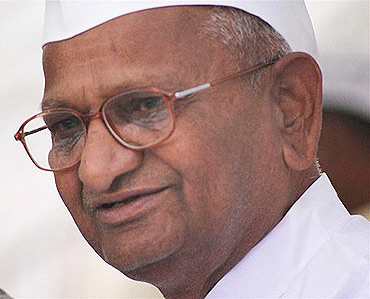
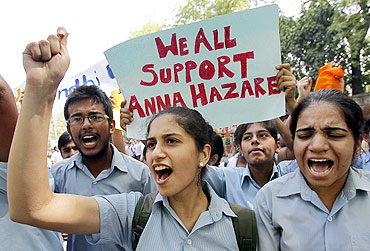
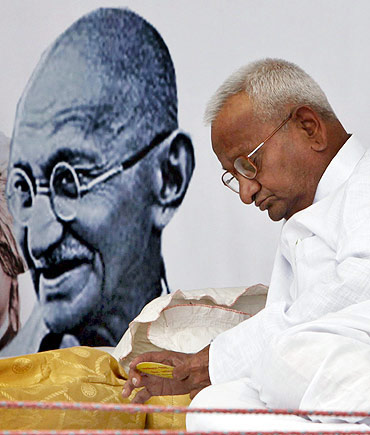
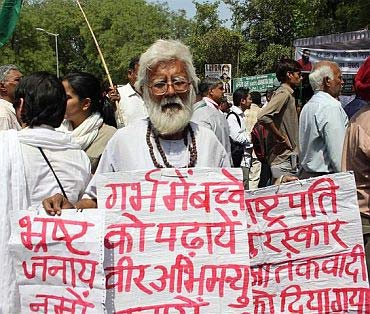
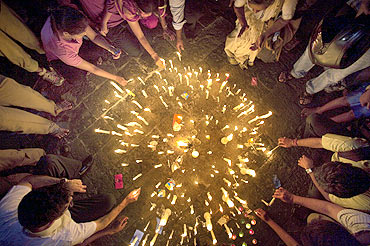
article